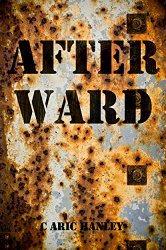Disclaimer: The other of this novel is a member of the writing and creative team at House of Geekery. This review is not a promotion but intended to be singular perspective of the reviewer.

This isn’t the first post-apocalyptic society that sci-fi readers have had available to them and it won’t be the last. As a sub-genre it has been consistently popular and with good reason. They’re imaginative and provide rich commentary on the world we live in. AfterWard falls into a trap many authors on this road do in putting more attention into the construction of their world than the protagonist. During early chapters it was difficult to get a handle on Sarc, having little personality beyond his wealth and position within the church. It isn’t long until he begins to feel conflicted about his position in the world and questions the nature of things that he begins to develop and it’s when he is genuinely challenged to do the right thing or fight for his survival that he becomes interesting. Without wanting to spoil what is in store for our hero, it is some of the revelations later in the story that help reveal who the man is, building a better arc for the character.
Ward’s heavily regulated society is a scathing representation of the modern church, and the values of the Evangelist movement in particular, as it depicts a world where the laws of the faith are brutally enforced on a wide scale. Contradictory laws and a moral that flies in direct defiance of human nature paints a disturbing picture. Especially unpleasant are the ‘Faith Rallies’ that see the sinful brought out and punished as an example, with the descriptions of violence possibly being distasteful for some readers. Time in Ward makes up the first half of the story, and it can feel repetitive with Sarc moving through first one routine and then another. The story takes on a more thrilling aspect when we finally explore the inner workings of the city and few unexpected occurrences take us to the wider outside world.
The outer areas of the city and world beyond offer an imaginative take on the future post-apocalypse world. Some of the figures encountered in the second half of the story lead to the most interesting encounters in the story – not that we’ll say to much about them here, though.
AfterWard takes a while to pick up steam but when it does it maintains a steady pace until the end. From what begins as another exploration of the dismal future ahead of use takes some fresh directions and gives us some interesting views, and the contradictions that we see on either side of the wall presents the readers with some ideas to ponder after they’ve turned the last page.

